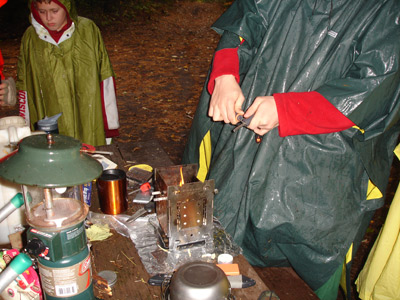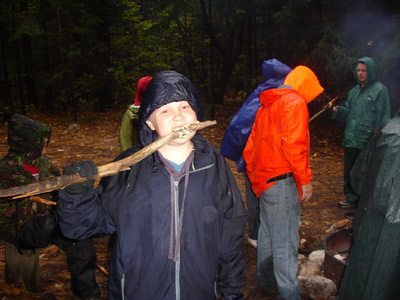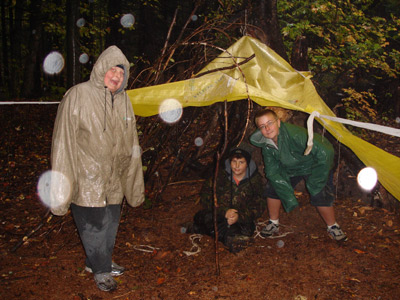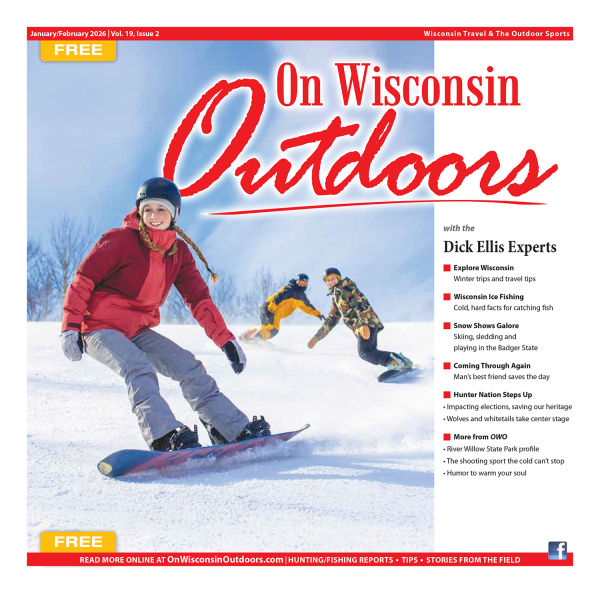Wilderness Survival
It started on a Friday morning, in a lofty barn, with the smell of straw in the air and sunlight streaming through the board cracks and onto the storage shelves that were tucked into a back stall. It was warm, dry and comfortable inside. On the shelves lay every camping supply imaginable.
Weather was coming in, and by the sounds of the weekend forecast, rainy weather and a lot of it. It would have made perfect sense to spend the weekend inside the barn, easing over the rough wooden floor and checking through all the Boy Scout camping gear that the barn’s owner kindly allows us to store there.
But we were going. It didn’t matter what kind of weather was coming. I only needed to take minimal gear out of the barn’s supplies, and it didn’t take the weekend to do it-far from it-I was packed and gone in 15 minutes. Wilderness survival is like that.
By late afternoon we were on the road, heading up the Door County Peninsula with a small Scout group for a wilderness survival simulation. The destination was Newport State Park, which is about as high up on the peninsula as you can get without wading into Lake Michigan and swimming for Washington Island.
Newport State Park is the only designated wilderness park in Wisconsin. It encompasses 2300 acres of forests, glens and fields, stretching along 11 miles of Lake Michigan shoreline. The park wraps around the ghost of an 18oo’s era logging camp that is surrounded by remnants of an era when virgin white pine stood tall along the shores.
What remains today are dense tracts of bog forest, upland meadows, and secluded coves and rock crags along the lake’s shore. For some reason or another, maybe known only to Mother Nature, the park draws one of the largest known concentrations of monarch butterflies in their yearly migration from Mexico.
There is year-round camping, but the sites are primitive and remote, accessible only to backpacker’s and bikers. We didn’t bring bikes-so that leaves one alternative.
At 10 o’clock at night, we were dropped five miles out of the park with backpacks, flashlights, compasses and maps. The goal was to find our way in the dark to a remote camp sight, packing our supplies with us, and spend the weekend living as sparsely as possible. It wasn’t a survival situation in the true sense, but it was as close to the beginning of a hard-core camping experience as you’ll find without truly getting lost.
As a matter of fact, I did get lost that first night. We had found our way to the camp, pitched tents, and were settling in for the night, when I got the bright idea to hike back to the supply truck for an extra blanket I’d stashed there. My bones aren’t as young as the Scouts-and if I was willing to walk a mile in the dark each way for a creature comfort-I figured I deserved it.
I got the blanket, and was feeling smug as I started back, so I guess I deserved my flashlight to conk out on me. I was stuck on the Lake Michigan shore, with a vast network of trails leading into hardwood forest and wetland bogs. There was no way I could make it back to base in the dark.
I had told my son where I was headed, and that’s definitely one of the most important rules anyone should remember when heading out in the wilderness alone. I was too tired to panic, so I followed that rule also. No dazzling escape plan came to me, so I simply sat down and waited on the shoreline trail.
It was really quite spectacular. Every star over the lake was magnified by the absence of outside light. The edge of our galaxy, the Milky Way, stretched across the sky in an arc, and every constellation popped out, highlighted by the brightest stars. There were stars up there that I used to know, but had long ago forgotten.
Sometime after midnight, when another adult leader finally searched me out, I almost hated to leave. The weatherman was wrong-not a cloud in the sky, a beautiful October night, and an extra blanket besides-this wilderness survival thing wasn’t too bad.
Somewhere in the predawn hours, there was a single drop on top of the tent, then another, and then it turned out the weatherman was correct after all.
Quite high on the survival list of man, is the ability to create fire. It follows that it holds true for wilderness survival too, except it becomes more of a high pressure thing. By morning, the whole forest was soaked. It doesn’t get any better than that.
There are lists of gadgets and techniques to start a survival fire: Magnesium strikers to ignite flaked pieces into burning hot and fast when sparked, old-fashioned flint and steel, a magnifying glass(yeah right), and storm proof matches that burn like a sparkler in wind and rain. I’ve actually seen videos of storm proofs being stomped into the mud and still coming out burning.

Sparking life into a portable heater.
Anything soaked in gasoline always works for me, but it’s a little dicey-not to mention a bad lesson to teach Boy Scouts. Besides, it’s kind of pointless because they’ll eventually learn that one on their own. We neglected to pack in any combustibles, settling instead for waterproof matches.
Finding dry tinder in bad weather is the hard part, because once you get a fire going, and can add enough small stuff to keep a flame, then wet wood will eventually burn. We found dead logs that you could punch your fist underneath and come out with dried wood pulp from the center. Birch bark will catch easily even when damp. Broken pine cones will build a blaze up.
We experimented with other methods on the side (except the magnifying glass!), but needless to say, after we got the fire going in a driving rain, we kept it going for the remainder of our stay.
Everyone got a one foot square piece of aluminum foil to cook on for the weekend. There were no utensils, these we carved out of sticks. Some of them were creatively done and looked like the kind of art you might find for sale in one of Door County’s many antique shops. Mine looked like a simple pine stick sharpened into a spear point, and that’s exactly what it was.
We fried bacon on tin foil and boiled eggs in paper cups-everyone got one cup to go along with the piece of foil. Biscuits were wrapped on sticks, rolled in bacon grease, and roasted over the fire. I baked an apple on my spear.

Wilderness survival dining.
For dinner, we cut an orange in half and ate the fruit, cooking ground beef in the empty orange half. It wasn’t half bad. If there was a real survival situation, where you had to hunt for food, venison would cook just fine in an orange rind. Maybe I’ll even start baiting my deer stand with oranges instead of apples.
The plan was to build shelters out of sticks and rain ponchos, and spend the night in our creations. We started the shelter building, but when it came down to it, everyone had a choice to stay in their tent. To a person, everyone made a good executive decision. The tents were more or less dry, and nobody really wanted to practice treating a hypothermia victim.
The rain kept falling. Sometimes it slanted in sideways. We had rain jackets; but it reaches a point, when you are outside long enough, where everything is going to get some degree of wet. Changing socks helped. But eventually you run out of socks.
That night the rain turned into something I’ve never seen before. Along the Lake Michigan shore, it came down like tiny snowflakes, although it was far to warm to snow. The tiny specks glistened in the glow of flashlights, and everyone was steaming like horses after a hard run. The trees were swirling in misty fog. We were the only ones crazy enough to be out in a wilderness park on a night like that, so you’ll have to take our word on the weird weather phenomenon.

Boy Scouts from Grafton’s Troop 840 improvise a storm shelter.
It rained through the night, and it was raining when we packed out on Sunday morning. By then we were just toughing it out. True wilderness survival reaches a point when rain changes to drizzle between downpours. It never quite stops, but the drizzle feels like sunshine. It’s like beating your head with a heavy steel hammer, then switching to a lighter wooden mallet. It feels like that. That’s real wilderness survival talk.









